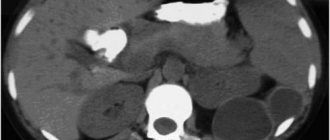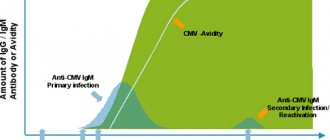Antibodies to cytomegalovirus IgG are produced during cytomegalovirus infection and persist for a long time, often for life, being markers of past infection.
Cytomegalovirus (CMV) is a member of the herpes virus family. A widespread infection, 70-90% of the population are carriers of CMV and therefore IgG will be detected in their blood even in the absence of a clinic. With a healthy immune system, cytomegalovirus infection occurs without symptoms and the person does not suspect that he is infected. CMV is transmitted by airborne droplets, sexually, from mother to child during pregnancy; transmission of the virus is possible during organ and tissue transplantation. Once in the body, CMV persists for life. When immunity decreases, the virus can become more active.
Cytomegalovirus infection poses the greatest danger when the patient has severe immunodeficiency; primary infection of a woman during pregnancy is also dangerous. The pregnant woman herself may feel well at this moment, but the lack of protective antibodies to cytomegalovirus of the IgG class leads to an infectious process in the fetus. Typically, the level of antibodies to cytomegalovirus IgG is determined in the first trimester of pregnancy together with IgM antibodies. It is advisable to conduct research at the stage of pregnancy planning - if IgG to cytomegalovirus is detected, therefore, immunity is formed and there is no risk of an initial encounter with CMV infection.
Complexes with this research
TORCH infections.
Avidity of IgG antibodies Diagnostics of TORCH infections with determination of avidity of IgG antibodies RUB 5,920 Composition Entry into IVF Examination when a woman enters the IVF procedure RUB 23,020 Composition
Examination during pregnancy. 1st trimester 16,690 ₽ Composition
IN OTHER COMPLEXES
- IVF planning RUB 12,990
- Pregnancy planning. Diagnosis of infections RUB 8,620
- Miscarriage RUB 40,070
What do the test results mean?
Reference values:
- <6.0 – no antibodies detected
- >=6.0 - antibodies detected,
- 6.0 AE/ml - 15.0 AE/ml - questionable result.
Result – <6.0 – no antibodies detected
- The absence of antibodies may indicate that the patient’s body has not previously encountered CMV infection
- Perhaps in the early period of infection, when IgG has not yet been developed. If there is clinical suspicion in this case, it is recommended to determine IgM to cytomegalovirus or detect CMV DNA by PCR.
Result – >=6.0 – antibodies detected
- Antibodies to cytomegalovirus were detected. Based on IgG determination alone, it is impossible to reliably determine the duration of infection.
Result 6.0 AE/ml - 15.0 AE/ml - questionable result.
- It is recommended to study IgM antibodies to CMV and repeat the study of IgG antibodies over time (for example, after 2 weeks). In the case of a current infection, antibody levels will rise within two weeks.
Detailed description of the study
Cytomegalovirus (CMV) is a type of herpes virus. It is found in the saliva, blood and other biological fluids of the carrier of the infection. The possibility of transmission of CMV in various ways - through household contact, sexual contact, as well as through blood transfusion, organ transplantation, through the placenta and during birth to a newborn from the mother - contributes to its wide distribution among people.
In most adults (up to 90%), antibodies to CMV IgG are detected, indicating that the immune system has previously encountered this infection. Typically, infection occurs in preschool age and is asymptomatic.
Some people develop a condition similar to mononucleosis (caused by the Epstein-Barr virus). It is accompanied by an increase in body temperature to high values (up to 39 C), sore throat, enlarged cervical lymph nodes and other localizations; in addition, the liver and spleen may become enlarged due to inflammation.
Once entering the human body, CMV, like other representatives of herpes viruses, remains in it for life in an inactive state. Reactivation of this infection can occur when the body's immune defenses are reduced, for example, with HIV infection. A characteristic complication specifically for HIV is the development of CMV retinitis - damage to the retina of the eyes, which can lead to loss of vision.
Other complications observed with decreased immunity are damage to the nervous system (encephalitis, meningitis), liver (hepatitis), and gastrointestinal tract (esophagitis, colitis). The risk of penetration into various organs is higher when the immune system is suppressed due to HIV infection or after organ transplantation.
CMV infection can negatively affect the course of pregnancy if it occurs after its onset. In this case, the risk of damage to the fetal nervous system, early labor and spontaneous abortion increases. Pregnant women must be tested for CMV infection.
Determination of IgG antibodies makes it possible to understand whether there has been previous contact with the virus or not, since these immunoglobulins are released several weeks after infection and can persist for life.
Antibodies to cytomegalovirus IgG, CMV IgG quantity.
Antibodies to cytomegalovirus IgG, CMV IgG quantitative
- allows you to determine the presence of IgG antibodies to cytomegalovirus (CMV or CMV), which indicates a current or recent infection. The duration of the incubation period ranges from 15 days to 3 months. With this infection, non-sterile immunity occurs (that is, complete elimination of the virus is not observed). Immunity to cytomegalovirus infection (CMVI) is unstable and slow. Reinfection with an exogenous virus or reactivation of a latent infection is possible. Due to long-term persistence in the body, the virus affects all parts of the patient’s immune system. When a person comes into contact with CMV, his immune system exhibits a protective response by producing IgM and IgG antibodies against CMV.
IgG antibodies to cytomegalovirus are specific immunoglobulins that are produced in the human body during the period of pronounced clinical manifestations of cytomegalovirus infection and indicate current or recent infection.
Cytomegalovirus infection
is a widespread viral infection of the body, which belongs to the so-called opportunistic infections, which usually occur latently. Clinical manifestations are observed against the background of physiological immunodeficiency states (children in the first 3–5 years of life, pregnant women - more often in the 2nd and 3rd trimester), as well as in persons with congenital or acquired immunodeficiencies (HIV infection, use of immunosuppressants, oncohematological diseases, radiation, diabetes and so on.).
Cytomegalovirus
- is part of the herpes virus family. Like other representatives of this group, it can persist in a person throughout his life. The risk group includes children 5–6 years old, adults 16–30 years old, as well as people who practice anal sex. Children are susceptible to airborne transmission from parents and other children with latent forms of infection. For adults, sexual transmission is more common. The virus is found in semen and other body fluids. Vertical transmission of infection (from mother to fetus) occurs transplacentally and during childbirth.
In healthy people with normal immunity, the primary infection occurs without complications (and is often asymptomatic). In rare cases, a picture of infectious mononucleosis develops (about 10% of all cases of infectious mononucleosis), clinically indistinguishable from mononucleosis caused by the Epstein-Barr virus. Replication of the virus occurs in the tissues of the reticuloendothelial system, epithelium of the urogenital tract, liver, mucous membrane of the respiratory tract and digestive tract. When immunity is reduced after organ transplantation, immunosuppressive therapy, HIV infection, as well as in newborns, CMV poses a serious threat, since the disease can affect any organ. The development of hepatitis, pneumonia, esophagitis, gastritis, colitis, retinitis, diffuse encephalopathy, fever, leukopenia is possible. The disease can be fatal.
Cytomegalovirus in immunodeficiency states
Cytomegalovirus is dangerous in cases of immunodeficiency and during pregnancy is potentially dangerous for the development of the fetus. Therefore, 5-6 months before a planned pregnancy, it is necessary to undergo a TORCH examination in order to assess the state of immunity in relation to these viruses, if necessary, carry out treatment, or provide prevention and control.
When a pregnant woman is initially infected with cytomegalovirus (in 35–50% of cases) or the infection is reactivated during pregnancy (in 8–10% of cases), an intrauterine infection develops. Confirming or excluding the fact of recent infection is especially important when examining pregnant women, since it is with primary infection during pregnancy that the risk of vertical transmission of infection and the development of fetal pathology is high.
If an intrauterine infection develops before 10 weeks, there is a risk of developmental defects and possible spontaneous termination of pregnancy. When infected at 11–28 weeks, intrauterine growth retardation and hypo- or dysplasia of internal organs occur. If infection occurs at a later date, the lesion may be generalized, affecting a specific organ (for example, fetal hepatitis) or appear after birth (hypertensive-hydrocephalic syndrome, hearing impairment, interstitial pneumonia, etc.). Manifestations of infection also depend on maternal immunity, virulence and localization of the virus.
To date, a vaccine against cytomegalovirus has not been developed. Drug therapy allows you to increase the period of remission and influence the recurrence of infection, but does not eliminate the virus from the body.
It is impossible to completely cure this disease: cytomegalovirus cannot be removed from the body. But if you promptly, at the slightest suspicion of infection with this virus, consult a doctor and carry out the necessary tests, then you can keep the infection in a “dormant” state for many years. This will ensure a normal pregnancy and the birth of a healthy child.
Laboratory diagnosis of cytomegalovirus infection is of particular importance in the following categories of subjects:
Women preparing for pregnancy
1. Latent course of the disease 2. Difficulty in differential diagnosis of primary infection and recurrent infection during examination during pregnancy 3. Severe consequences of intrauterine infection in newborns
Pregnant women
1. Severe consequences of intrauterine infection in newborns 2. Immunodeficiency states (generalized forms)
Consecutive repeated determination of the level of IgG antibodies in newborns makes it possible to distinguish congenital infection (constant level) from neonatal infection (increasing titers). If the titer of IgG antibodies does not increase during repeated (after two weeks) analysis, then there is no reason for alarm; if the titer of IgG increases, the issue of abortion should be considered.
CMV and TORCH
CMV infection is part of the group of TORCH infections (the name is formed by the initial letters of the Latin names - Toxoplasma, Rubella, Cytomegalovirus, Herpes), which are considered potentially dangerous for the development of a child. Ideally, a woman should consult a doctor and undergo laboratory testing for TORCH infection 2–3 months before a planned pregnancy, since in this case it will be possible to take appropriate therapeutic or preventive measures, and, if necessary, compare the results of studies before pregnancy in the future with the results of examinations during pregnancy.
Indications:
- preparation for pregnancy;
- signs of intrauterine infection, feto-placental insufficiency;
- state of immunosuppression due to HIV infection, neoplastic diseases, taking cytostatic drugs, etc.;
- clinical picture of infectious mononucleosis in the absence of infection caused by the Epstein-Barr virus;
- hepato-splenomegaly of unknown nature;
- fever of unknown etiology;
- increased levels of liver transaminases, gamma-GT, alkaline phosphatase in the absence of markers of viral hepatitis;
- atypical course of pneumonia in children;
- miscarriage (frozen pregnancy, recurrent miscarriages).
Preparation
It is recommended to donate blood in the morning, between 8 am and 12 pm. Blood is drawn on an empty stomach, after 4–6 hours of fasting. It is allowed to drink water without gas and sugar. On the eve of the examination, food overload should be avoided.
Interpretation of results
Units of measurement: UE*
A positive result will be accompanied by an additional comment indicating the sample positivity rate (SP*):
- CP >= 11.0 – positive;
- CP <= 9.0 – negative;
- CP 9.0–11.0 is doubtful.
Exceeding reference values:
- CMV infection;
- intrauterine infection is possible, the likelihood of its occurrence is unknown.
Within reference values:
- No CMV infection was detected;
- infection occurred within the previous 3–4 weeks;
- intrauterine infection is impossible (except in the presence of IgM).
“Doubtful
” is a borderline value that does not allow reliably (with a probability of more than 95%) to classify the result as “Positive” or “Negative”. It should be borne in mind that such a result is possible with a very low level of antibodies, which can occur, in particular, in the initial period of the disease. Depending on the clinical situation, repeat testing of antibody levels after 10–14 days may be useful to assess changes.
*Positivity rate (PR) is the ratio of the optical density of a patient's sample to the threshold value. CP - positivity coefficient, is a universal indicator used in enzyme immunoassays. CP characterizes the degree of positivity of the test sample and can be useful to the doctor for the correct interpretation of the result obtained. Since the positivity rate does not correlate linearly with the concentration of antibodies in the sample, it is not recommended to use CP for dynamic monitoring of patients, including monitoring the effectiveness of treatment.






